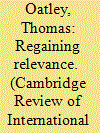|
|
|
Sort Order |
|
|
|
Items / Page
|
|
|
|
|
|
|
| Srl | Item |
| 1 |
ID:
157553


|
|
|
|
|
| Summary/Abstract |
What factors generate financial fragility in open economies? Existing research assumes that the development of these conditions is more likely to emerge under some configurations of domestic economic and political attributes. We examine the development of financial fragility through the ontological lens of the new interdependence approach, which assumes that global factors can be as important as local factors in generating outcomes. We analyze global financial conditions from 1978 to 2009 and argue that contemporary global finance is an oscillating system that generates boom and bust capital flow cycles. The phases of this cycle are a consequence of the scale of US net borrowing on global markets: when the United States is a large net importer of foreign capital, other economies struggle to attract foreign capital and are substantially less likely to develop fragile financial positions; when US net capital imports fall, other economies receive an abundance of foreign capital, and financial fragility becomes more likely. In contrast, we find little evidence that cross-national variation in political institutions or financial systems explains why fragility develops, although some regional interdependencies are evident. We conclude that global conditions drive the probability of crises occurring someplace in the system, while local outcomes appear to be idiosyncratic.
|
|
|
|
|
|
|
|
|
|
|
|
|
|
|
|
| 2 |
ID:
121594


|
|
|
|
|
| Publication |
2013.
|
| Summary/Abstract |
Although the subprime crisis regenerated interest in and stimulated debate about how to study the politics of global finance, it has not sparked the development of new approaches to International Political Economy (IPE), which remains firmly rooted in actor-centered models. We develop an alternative network-based approach that shifts the analytical focus to the relations between actors. We first depict the contemporary global financial system as a network, with a particular focus on its hierarchical structure. We then explore key characteristics of this global financial network, including how the hierarchic network structure shapes the dynamics of financial contagion and the source and persistence of power. Throughout, we strive to relate existing research to our network approach in order to highlight exactly where this approach accommodates, where it extends, and where it challenges existing knowledge generated by actor-centered models. We conclude by suggesting that a network approach enables us to construct a systemic IPE that is theoretically and empirically pluralist.
|
|
|
|
|
|
|
|
|
|
|
|
|
|
|
|
| 3 |
ID:
095380


|
|
|
|
|
| Publication |
2010.
|
| Summary/Abstract |
Why did some developing country governments accumulate large foreign debt burdens in the late twentieth century while others did not? I hypothesize that variation in foreign indebtedness is a product of the impact of regime type on government borrowing and investment decisions. Autocratic regimes will borrow more from foreign lenders and invest fewer of these funds in public goods than democratic regimes. Consequently, autocracies are more likely to develop large foreign debt burdens than democracies. I test this hypothesis by estimating error correction models against a sample comprising 78 developing countries between 1976 and 1998. The analysis suggests that autocratic governments accumulated substantially larger foreign debt relative to their national income than democratic governments. The analysis has implications for the likely consequences of contemporary debt relief initiatives.
|
|
|
|
|
|
|
|
|
|
|
|
|
|
|
|
| 4 |
ID:
103891


|
|
|
|
|
| Publication |
2011.
|
| Summary/Abstract |
International political economy (IPE) should transition to "third-wave" scholarship because Open Economy Politics (OEP), which dominates current American IPE scholarship, can generate inaccurate knowledge. OEP can produce inaccurate knowledge because it studies domestic politics in isolation from international or macro processes. This methodological reductionism is often inappropriate for the phenomena IPE studies because governments inhabit a complex social system. As a result, the political choices that OEP strives to explain are typically a product of the interplay between domestic politics and macro processes. When OEP omits causally significant macro processes from empirical models, the models yield biased inferences about the domestic political relationships under investigation. Although scholars tolerated such errors when the gains from OEP were large, these errors are less tolerable now that OEP has matured. Consequently, the field should transition toward research that is nonreductionist, problem-driven, and pluralistic.
|
|
|
|
|
|
|
|
|
|
|
|
|
|
|
|
| 5 |
ID:
179048


|
|
|
|
|
| Summary/Abstract |
Mainstream American international political economy (IPE) has gradually lost relevance as a framework for understanding developments in the global political economy. It offers little help for understanding the impact of the China Shock, the development and consequences of the Global Financial Crisis, or the anti-system politics that began to emerge in 2016. These are the three developments that largely defined global political economy during the first quarter of the twenty-first century. It is even less helpful for explaining the climate crisis and the energy transition, the issues that will increasingly shape the global political economy for the next quarter century and beyond. Restoring relevance to American IPE will require the development of theoretical frameworks that are intrinsically systemic and dynamic. I suggest that the Uneven and Combined Development, and the Political Economy of Complex Interdependence, perspectives, supplemented by greater attention to system parameters, provide a strong foundation upon which to build such frameworks.
|
|
|
|
|
|
|
|
|
|
|
|
|
|
|
|
|
|
|
|
|